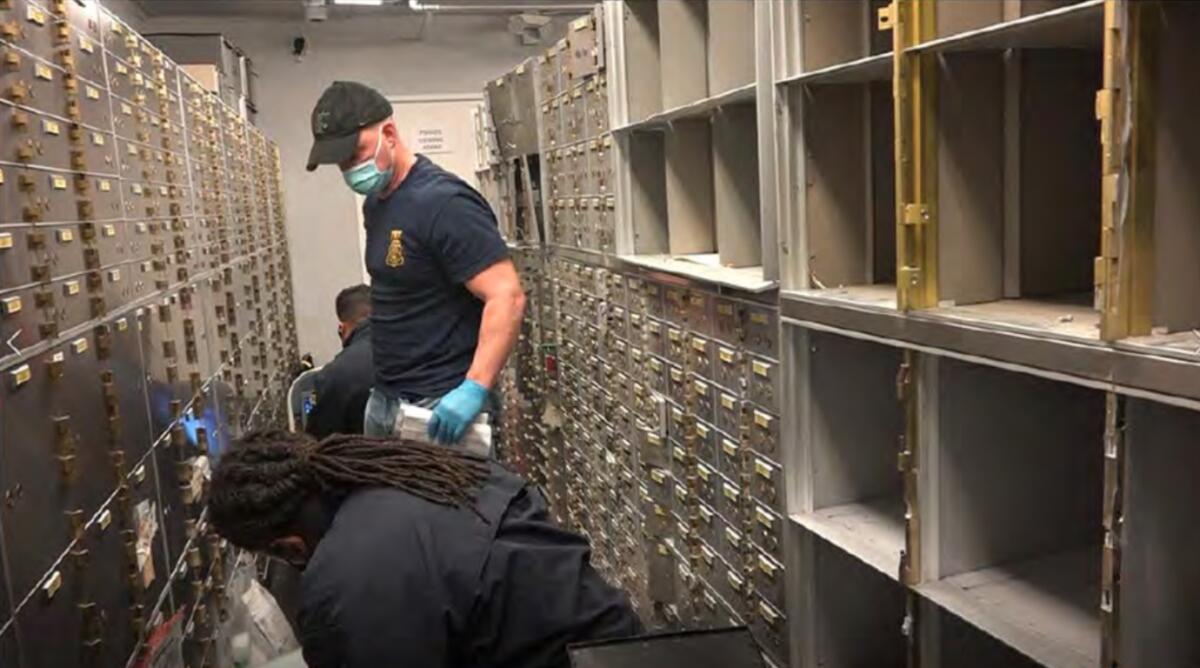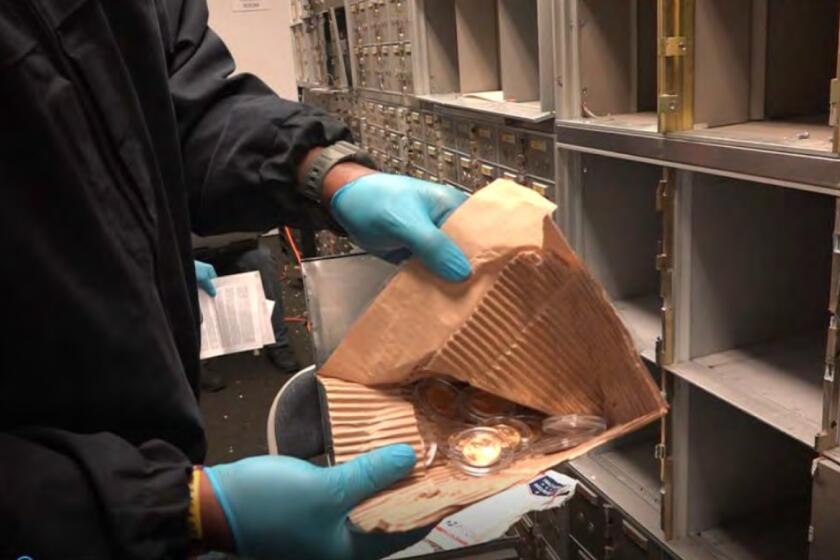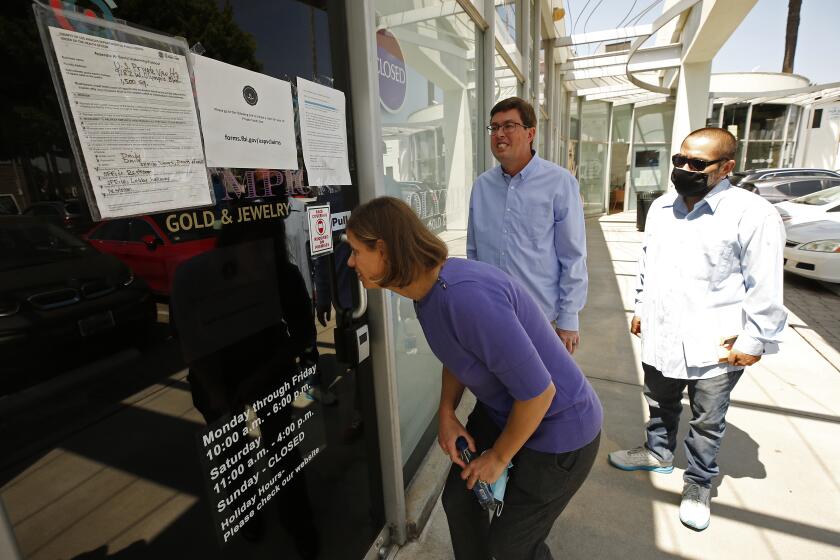Appeals court finds FBI did violate rights of some Beverly Hills safe-deposit box holders

- Share via
The FBI violated people’s constitutional rights when it opened and “inventoried” the contents of hundreds of safe-deposit boxes during a raid on a Beverly Hills vault in 2021, a federal appellate court ruled Tuesday.
The ruling by a three-judge panel of the U.S. 9th Circuit Court of Appeals reverses a lower court decision in favor of the FBI. The panel found that the agency’s cataloging of the contents of the privately rented boxes, without individual criminal warrants for each, violated the box holders’ 4th Amendment rights against unreasonable searches and seizures.
The ruling requires federal officials to destroy any inventory records they have kept on hundreds of box holders who have otherwise been found faultless and had their physical property returned. Officials must also destroy records that have been included in a criminal law enforcement database called Sentinel.
The decision could also benefit other box holders whose property the FBI is still trying to keep under federal forfeiture laws, and who are suing the agency for the return of their property in their own pending cases.
The FBI declined to comment. Thom Mrozek, a spokesman for the U.S. Attorney’s Office in Los Angeles, declined to comment on the specifics of the court’s ruling. But he said the prosecutor’s office was “prepared to destroy records of the inventory search.”
Judge rejects claim that the FBI violated the rights of hundreds of people when it searched their safe-deposit boxes in Beverly Hills
The ruling is the latest twist in an unprecedented case that has attracted national attention for several reasons, including the scope of the assets involved — tens of millions of dollars in cash and other valuables — and the location of the raided vault in one of the toniest neighborhoods in America.
The case had also attracted attention because of the FBI’s initial decision to open and review the contents of all of the boxes and seize any assets worth more than $5,000. Attorneys for the box holders said such a move by the FBI would set a dangerous precedent — and embolden more raids of a similar nature in the future — if the courts allowed it to stand.
Box holders and their attorneys cheered the decision Tuesday, which they said places important constraints on FBI searches in the future.
Among those celebrating were lead plaintiffs Paul and Jennifer Snitko, an aeronautics engineer and entertainment attorney who said they had placed family heirlooms, important legal documents such as wills and other sentimental items in a box at the U.S. Private Vaults store on Olympic Boulevard after fires had repeatedly forced them to evacuate their Pacific Palisades home with little warning.
“This is a good day,” Jennifer Snitko, 48, said in an interview with The Times. “Not just for us, but for all Americans — to say you have a right to privacy, your 4th Amendment right does exist. It’s a constitutional right for you to be able to keep your things privately and not have them raided without a proper warrant.”
U.S. Private Vaults, which allowed customers to rent boxes without providing the sort of personal information banks require, was shut down by the 2021 raid. The company later pleaded guilty to drug and money laundering charges.
As part of its case against the vault, prosecutors had alleged that some of the vault’s customers were storing criminal proceeds in their boxes. Court records show the FBI also had developed a plan to permanently confiscate everything inside of the boxes worth at least $5,000 as part of a wholesale forfeiture, based on an assumption that those assets were somehow tied to unknown crimes.
However, in their initial warrant request, the FBI and the U.S. Attorney’s office had not asked to seize the contents of the individual boxes in the vault and left out their plans to do so. They instead assured U.S. Magistrate Judge Steve Kim that agents would follow FBI policies for taking inventory of the box contents in order to protect against theft allegations, then contact the box owners about retrieving their property.
Writing for the 9th Circuit panel Tuesday, Circuit Judge Milan D. Smith Jr. found that the government had gone beyond the scope of its warrant — and its own rules for taking inventory of property that is not the subject of a warrant but is nonetheless in its possession — by searching the boxes and launching subsequent criminal investigations based on their contents.
Smith, an appointee of President George W. Bush, also wrote that it was “particularly troubling” that the government could not explain how far it believed it could go with such “inventory” searches. Without such an explanation, he wrote, it was unclear how those searches differed from the sort of limitless searches that existed in pre-revolutionary America — and which prompted the 4th Amendment to be written into the Constitution in the first place.
Smith was joined by Circuit Judge Carlos T. Bea, another Bush appointee, and joined in part by Circuit Judge Lawrence VanDyke, an appointee of President Trump.
Smith also wrote a separate, concurring opinion — which the other judges did not join — in which he argued that the contents of locked safe-deposit boxes should not be subject to government “inventory” at all when the government has no warrant to review their contents.
Customers of U.S. Private Vaults are suing the FBI over its attempt to confiscate gold and silver, jewelry and $86 million in cash from safe deposit boxes.
Rob Johnson, an attorney for the box holders, said the decision was a major win for his clients and an important ruling that bolsters the 4th Amendment rights of people across the country.
“This decision draws a line in the sand, and it prevents the government from doing exactly the same thing all over again,” Johnson said.
The Beverly Hills raid “was going to become a model for government to follow” all across the country, but “with this decision today, I think we’re a lot safer from that,” Johnson said. “They are now on notice that this type of behavior doesn’t comport with the 4th Amendment.”
David Smith, an attorney for other box holders who were not party to the case before the appellate court, said the court’s decision could also benefit his clients.
He said two of his clients have never had the contents of their boxes returned. Instead, based on those contents, the government launched criminal investigations into them and seized additional property from other locations — though they have not been charged with any crimes.
Tuesday’s decision will bolster their argument that the evidence seized from their boxes in the Beverly Hills vault was unconstitutionally obtained and should be suppressed, as should any evidence the government was able to obtain as a result of information gleaned from inside their boxes.
“People such as our clients, who haven’t had their day in court, will certainly rely on [Tuesday’s decision] to seek suppression of the evidence against them that was obtained as the fruit of the search of their safety deposit boxes,” attorney Smith said.
Snitko said she was “giddy” on Tuesday over the news of the decision, which immediately took her back to the morning when she and her husband first learned that their box had probably been seized by reading a news story about the raid in the Times.
“They can’t do this. They can’t do what they did,” she’d said that morning.
Tuesday’s decision proved she was right.
More to Read
Sign up for Essential California
The most important California stories and recommendations in your inbox every morning.
You may occasionally receive promotional content from the Los Angeles Times.
















